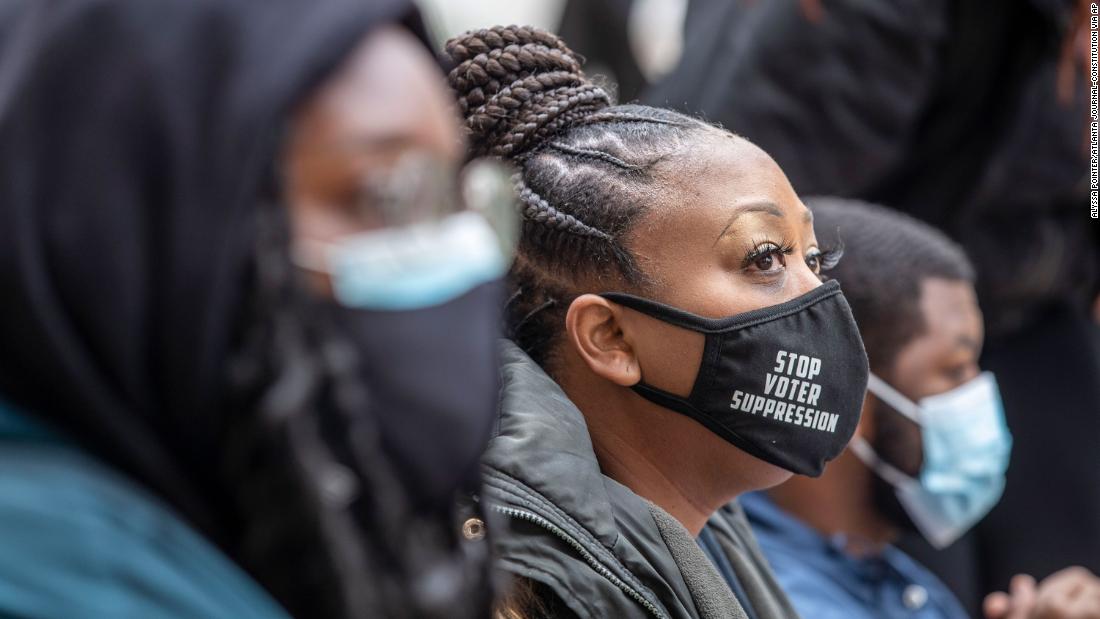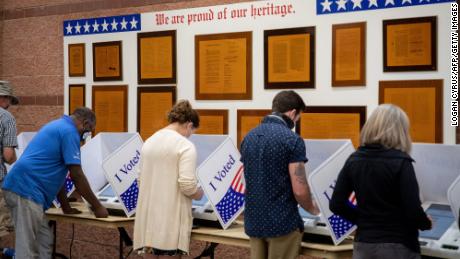‘Dripping in the blood of Jim Crow’: Voting rights groups say GOP-backed bills in Georgia target Black voters
Their efforts, however, could be reversed by Republican-backed bills advancing in the Georgia Legislature that activists say are reminiscent of tactics used to prevent Black people from voting in the South during the Jim Crow era.
“We know that their targets are Black voters,” said Cliff Albright, co-founder of the Atlanta-based Black Voters Matter. “These (legislation) notes are dripping in the blood of Jim Crow.”
Black Voters Matter, the Georgia NAACP, the New Georgia Project and other civil rights groups are now in a battle to protect Black voting power, launching a campaign this week to stop the voter restrictions from moving forward.
They are also demanding that Congress pass federal voting rights legislation that would roll back the state-level laws.
The controversy over voting rights comes as the civil rights community honors the 56th anniversary of “Bloody Sunday” this weekend for the first time without voting rights icon John Lewis, who died last year. Lewis has been lauded as a hero who fought tirelessly for equal voting rights for Black people. Voting rights leaders have vowed to keep his legacy alive.
Georgia’s state House passed a bill this week that includes several measures that restrict voting access, including a ban on automatic voter registration, a limit on Sunday early voting days and ballot drop boxes, and a number of restrictions and ID requirements for absentee voting. The bills come after former President Donald Trump made baseless claims of a rigged 2020 election, saying there had been widespread voter fraud in Georgia.
“Clearly, the attack is based on when it is and how it is that they know Black voters are being mobilized to turn out,” Albright said. “They know that they can’t win elections if we actually expand access to voting or even if we just maintain it.”
Martin Luther King III, the oldest son of the late Rev. Dr. Martin Luther King Jr. and Coretta Scott King, said the Republican-backed measures are a more “sophisticated” version of the Jim Crow practices that prevented Black people from voting. For example, he noted that many Black people were forced to take literacy tests that were impossible to pass in order to vote during the Jim Crow era. Now they are being suppressed with shortened voting hours and limited days, he said.
“I think it certainly does go back to the Jim Crow era because it has a racist tone,” King said. “You’re targeting communities of color, and historically the African American community votes by and large for Democrats.”
A nationwide effort to ‘Protect Our Power’
Some Black voters in Georgia say the measures are discouraging and could impact turnout.
Calvin Payne of Vinings, Georgia, said many Black voters can’t afford to take off work or stand in line for hours to vote, so they need expanded access.
“I just think it’s ridiculous,” Payne said. “When we complicate things, that’s when people say, ‘OK, I don’t need to vote.’ “
Albright’s Black Voters Matter and other groups are holding rallies, printing statewide advertisements, running phone bank campaigns, and seeking support from businesses and corporations to promote their efforts to halt the state laws from moving forward.
The Georgia proposals mirror Republican-backed voting bills that have emerged across the country. As of February, state legislators in 43 states had introduced more than 250 bills with restrictive voting provisions, according to a tally from the Brennan Center for Justice at New York University.
Black lawmakers and leaders vow to protect voting rights
National Urban League President Marc Morial released a statement pleading for the Senate to act on HR 1.
“We have watched in dismay as state lawmakers around the country responded to record turnout among voters of color with aggressive, racially motivated restrictions on voting,” Morial said. “The House of Representatives admirably stood against this anti-democracy movement last night by passing a sweeping expansion of voting rights contained in the For the People Act. Now the Senate must do the same.”
Senate Democrats told reporters Wednesday they were determined to pass legislation to protect voting rights. Sen. Raphael Warnock of Georgia called the Republican-led state measures “undemocratic.”
“We must be clear: It’s not their job as politicians to choose their voters. It’s the job of voters to choose who will represent them,” Warnock said during a virtual roundtable event for Black journalists. “We’ll be working very hard to pass the For the People Act (and) the John Lewis Voting Rights Advancement Act to restore vital voting protections and expand access to the ballot, and we’ll be fighting every day to get this done.”
Georgia NAACP President James Woodall said voting restrictions advancing in the state House are unjust and could potentially be in violation of existing federal voting rights laws. Woodall said his NAACP chapter is prepared to take legal action if necessary.
“We need to create a situation where elections are not only safe, secure and accessible but they are also compliant with federal law,” Woodall said.
CNN’s Annie Grayer, Clare Foran and Dan Merica contributed.
![]()




